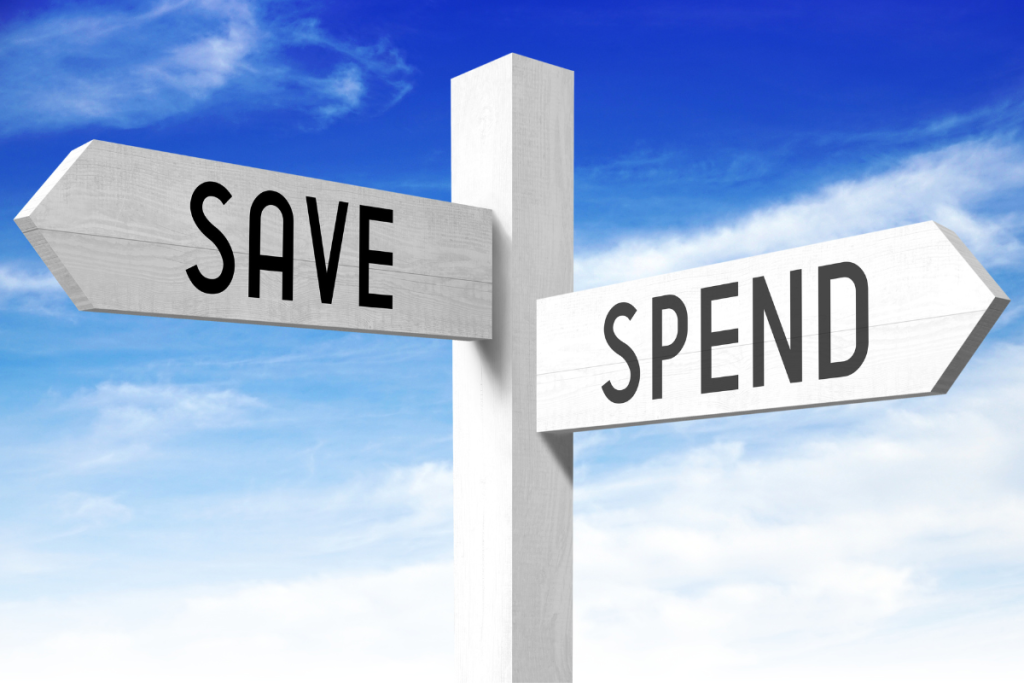
Table of Content
On the journey toward financial freedom, many believe that being rich simply means earning a lot of money. But in reality, the difference between the wealthy and the majority doesn’t lie entirely in income generation. The real distinction is in how they know when to stop spending and investing. “The wealthy don’t spend it all – they know when to stop” is not just a philosophy, but also a expense management strategy that allows them to maintain long-term sustainability across generations.
What does “enough” mean in personal finance management?
This seemingly simple question is the key to understanding how the wealthy build stability. Their definition of “enough” isn’t tied to a specific figure in the bank account, but to balance: enough to live comfortably, enough to manage risks, and enough to invest in the future.
The wealthy often establish a baseline lifestyle and stick to it, even as their income grows. They separate savings, investment, and consumption from the start, almost like “locking away” a portion of income so they won’t fall into the trap of spending everything. This is how they avoid the cycle of “earn more, spend more” – a cycle that keeps many financially stuck despite high salaries.
Why do the wealthy choose to save or reinvest instead of consuming luxuriously?

One of the clearest differences between the wealthy and others lies in their purpose for using money. For them, money is not merely for short-term gratification but a tool to create new streams of income.
Instead of buying a third car or another luxury watch, the wealthy often direct their funds toward income-generating assets: rental real estate, dividend stocks, promising startups, or funded trading accounts with large capital allocations. These vehicles not only preserve value but also create opportunities for growth. The habit of “keeping money to grow” is exactly why their wealth compounds over time, instead of being drained by consumption.
Is financial freedom the point where you stop chasing income?

Many think financial freedom means never having to work again. But the wealthy understand that financial freedom doesn’t mean “stop earning money,” but rather stop depending on money.
When passive income streams cover their expenses, they have the freedom to work out of passion instead of pressure. Financial freedom is when they step off the relentless treadmill of chasing every paycheck, shifting focus instead toward managing and growing their money. That’s why many wealthy individuals build diversified investment portfolios rather than relying solely on a single source of income.
“Spend it all or keep it?” Which is more sustainable?
Should you spend everything to enjoy life or keep it all to accumulate wealth? The wealthy don’t choose extremes – they choose balance. They still enjoy life, but within a planned boundary. Every dollar spent is weighed against the question: will this bring long-term value to my life?
For example, spending on health, education, or meaningful experiences is seen as an investment in themselves, not just consumption. In contrast, splurging on items that only satisfy ego in the short term is often minimized. This balance allows them to enjoy the present while continuing to build for the future.
One of the simplest but most effective practices is automating cash flow. The wealthy often apply the principle of “pay yourself first”: as soon as income arrives, a set portion goes directly into investment or long-term savings.
This removes the temptation to overspend, since the “spendable” portion is already clearly defined. Additionally, they set flexible spending thresholds: if a purchase exceeds a certain amount, they pause for at least 24–72 hours before deciding. This small habit prevents emotional spending and keeps financial discipline intact.
When should you stop emotional spending?
The wealthy understand a harsh truth: emotions are the biggest enemy of personal finance. Shopping to relieve stress, to show off, or to “keep up with others” are all traps that drain wealth.
The key is knowing where to draw the line. When spending surpasses safe ratios (for example, 30% of monthly income), it’s a signal to stop. Instead, they channel emotional needs into less costly but more enriching alternatives – reading, sports, or investing in new skills.
Does spending less really mean more opportunities to invest?

The answer is yes – but it’s not that simple. Spending less isn’t about living in deprivation, but about freeing up capital for investment. The wealthy don’t restrict themselves to extremes, but instead maximize every saved dollar by turning it into investment capital.
Someone with disciplined spending habits can allocate 20–30% of income into profit-generating channels such as stocks, real estate, or funded trading accounts. Over time, the power of compounding and continuous reinvestment creates an enormous gap between those who save to invest and those who spend it all.
Debt isn’t inherently bad – but reckless consumer debt can destroy financial plans. The wealthy always know when to stop to avoid falling into this spiral. They don’t borrow to satisfy short-term desires. If they use leverage, it’s to generate larger income streams – like borrowing for rental properties or trading with funded capital.
The wealthy don’t fear debt; they simply know the safe limits, and when to stop before compromising long-term security.
Balancing enjoyment today and saving for tomorrow
This is the question everyone wrestles with. The wealthy resolve it by integrating both goals into one strategy. They treat learning, traveling, and health as investments – because these bring both present enjoyment and future value.
They don’t fall into the trap of “only hoarding but never living,” nor do they allow impulse spending to erode their foundation. The secret lies in mindful decision-making with every expense.
The wealthy don’t spend it all – they make money work
After exploring these questions, one clear pattern emerges: the wealthy don’t spend it all because they let money work for them. They invest in assets, people, technology, and sustainable models like prop trading.
Instead of exhausting themselves chasing more income just to spend it, they stop, calculate, and redirect their cash flow into areas where it can multiply. This difference is what allows them not just to be wealthy in the present but to sustain wealth across generations.
“The wealthy don’t spend it all – they know when to stop” is not a dry philosophy, but a practical lesson for anyone striving toward financial freedom. Stopping at the right time in spending, knowing what is “enough,” reinvesting instead of splurging, and balancing the present with the future – these are principles anyone can apply right now.
The wealthy become rich not only because they earn well, but because they use money wisely. And more importantly, they understand that true freedom comes when you master money – not when money masters you.

















